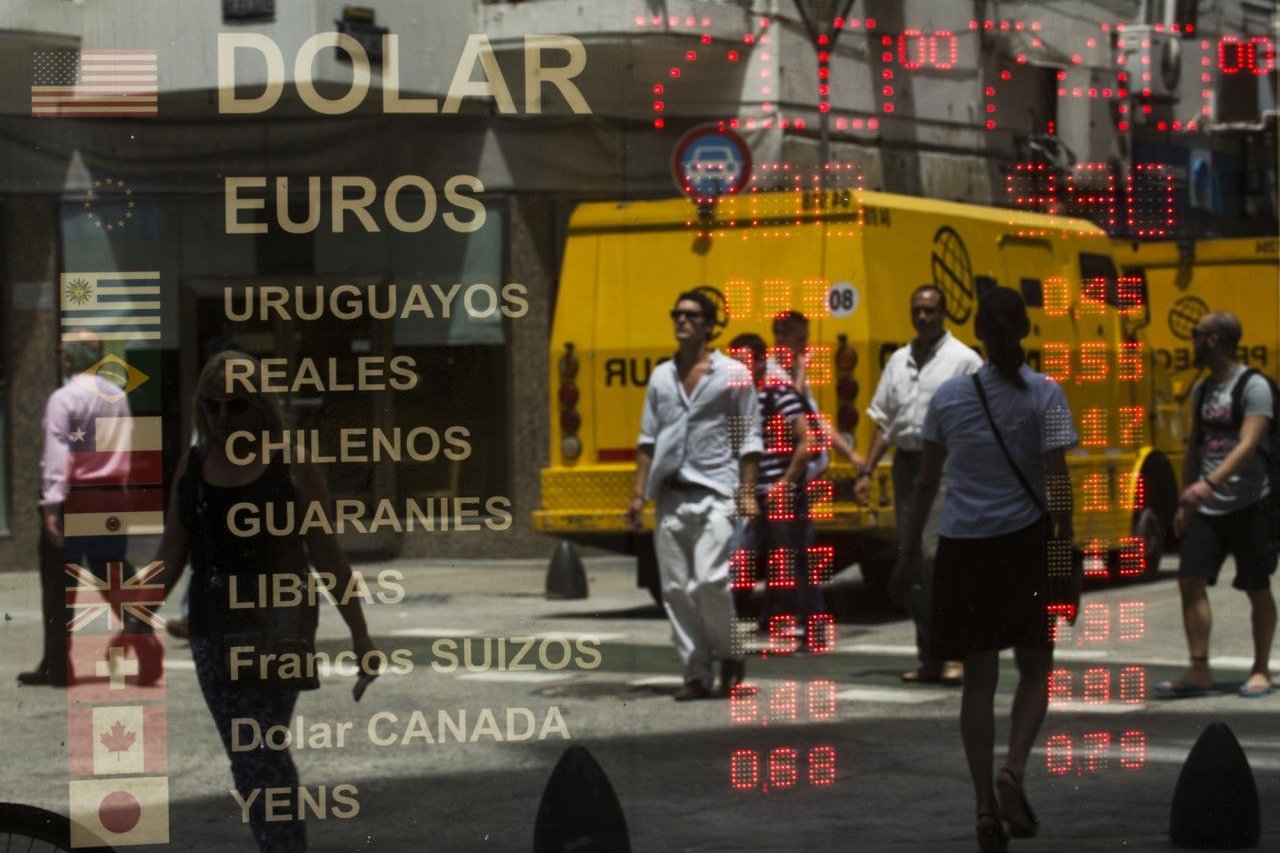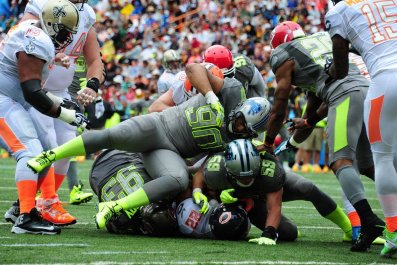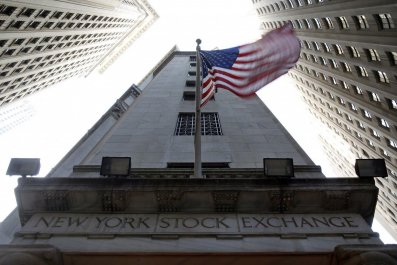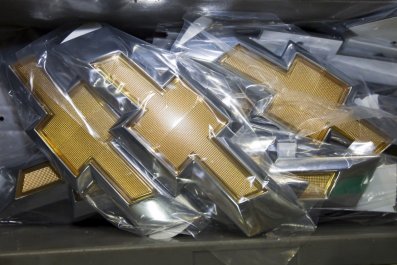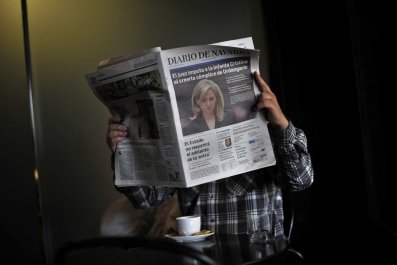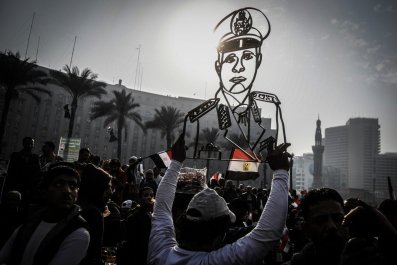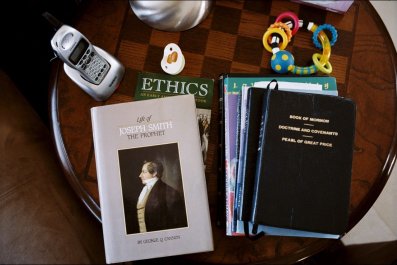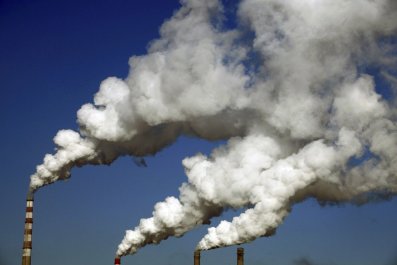Outside an overflowing courtroom in downtown New York, a well-heeled trader from Buenos Aires, Miguel Catella, paces the stairs under a pale winter sun, lost in thought over the plight of his native country.
"Things are out of control in Argentina," he sighs. "We are in a constant state of panic. We are losing a great deal of money. The government is not listening to its own people."
Inside the court, Argentina's economic minister, vice president and a rabble of high-powered lawyers argue against an injunction by the Second Circuit Court of Appeals that would force the country to make full payment on tens of billions of dollars of bonds to a group of New York hedge funds. If the court compels them, they argue, Argentina will simply refuse to pay.
One of the three judges, Reena Raggi, is unable hide her amazement at this line of argument. "So the reason not to grant this injunction - is that Argentina is going to default?" she asks.
The short answer from Argentina's delegation: Yes.
Fast-forward one year. As Argentina prepares to take its grievances in New York to the U.S. Supreme Court, its debt problems back home have turned into a full-blown financial crisis.
In the same way that Argentina's legal team threatened to halt payments on its government bonds, the nation's central bank simply decided last Thursday to cease making purchases in support of the nation's currency - the peso - sending it into instant freefall.
"The motivation for the timing of the devaluation by the government is not clear," said analyst Tony Volpon of global research provider Nomura Group in New York. "It is also not clear if this represents a 'one-off' devaluation" - or something that will snowball into even bigger trouble for Argentina.
So far, it has been nightmarish enough. The devaluation prompted the biggest one day collapse in Argentina's currency in more than a decade and the sudden loss of its people's already waning purchasing power, triggering a rush to buy U.S. dollars and household basics such as appliances and foodstuffs before the devaluation feeds through into the nation's prices which are set to soar far beyond reach.
(While price accords were reached earlier this month in Argentina on certain crucial food items, mark-ups of as much as 25 percent or more have been seen across the capital for electronics, wine and other goods. Some retailers won't sell any goods at all until the price volatility levels off.)
The blogosphere exploded at Argentina's embarrassment, with one heavily trafficked financial blog, Zerohedge, observing that the widely used if unfortunately named foreign-exchange abbreviation for the Argentine peso -- ARS -- had become an "accurate identifier."
Enter Argentina's 60-year-old president, Cristina Fernández de Kirchner, emerging from a months-long recovery after emergency surgery late last year to remove a blood clot near her brain.
"I was reading in the newspapers this morning headlines that said, 'Cristina reappears.' And I said, 'What is the opposite of reappears? Disappears,'" she said, adding: "They wanted to give it a touch of Hollywood."
Another touch of Hollywood came this week. As reports trickled in that Argentina's devaluation had pushed the price of a Whirlpool refrigerator up 30 percent in downtown Buenos Aires, Argentines learned Kirchner had jetted off to a conference in Cuba where she lavishly lunched with the retired and aged communist dictator, Fidel Castro.
"Fidel invited me to lunch," she said in a statement Sunday. "Very good food." In the circumstances of her country's economic crisis, to many Argentines the president's glib remark summoned the ghost of Marie-Antoinette urging the hungry to eat cake.
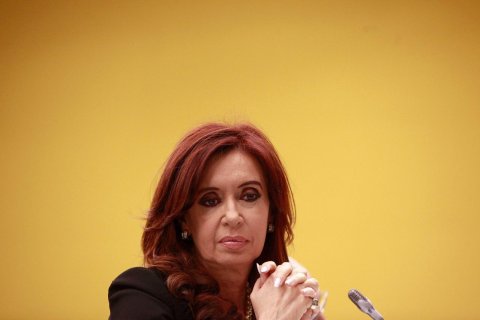
The two-hour meeting with Fidel was a success, at least according to the official Cuban news agency, Prensa Latina. "After exchanging affectionate greetings, the South American president and the Cuban leader discussed regional issues and problems facing mankind, such as food security and armed conflicts around the world," it said. (Whether the "regional issues" included Argentina's hardships under the Kirchner administration remained unclear.)
It is a strange turn of events for a president re-elected in a landslide in 2011 and running under "Peronist" ideals that hold sacred the three key tenets of social justice, political sovereignty and economic independence.
"The situation is quite serious," said Steve Hanke, a professor of applied economics at Johns Hopkins University, director of the Troubled Currencies Project at the Cato Institute, a Washington think tank, who has advised Argentina in the past on its currency regime.
"With the current government, I think it's hopeless," he said. "I think they're going to the wall on it. They will keep clinging to their failed economic policies until the end."
Hanke said Argentina's peso qualifies as a troubled currency with inflation "at the top of the league" at around 63 percent a year. The rate is significantly higher than what the government is reporting at 11 percent. And "it is much worse than what is being reported by the press," he said.
Dante Sica, director of the Buenos Aires financial consulting firm Abeceb, said the current dire economic situation -- Argentina's Minister of Economy, Axel Kicillof, is the fourth such minister in five years -- is due in part to the Argentine government's resistance to changing certain macroeconomic policies and to its poor economic policy management.
It hasn't helped that Argentina has also been economical with the truth about its inflation figures and other economic data, prompting an unprecedented slap last year from the International Monetary Fund . "No one believes the official information system anymore," Sica said. "The government has displayed a series of comings and goings that have failed to generate a more certain and trusting environment."
{C}{C}{C}{C}{C}
Pain also is evident almost wherever you look in Argentina. One 35-year-old woman in Buenos Aires told Newsweek she waited in line an hour to buy a refrigerator - and had to settle for the one on display, because the store was already sold out of them.
No Argentine reading this, she said, would be surprised by her story. And she gives a clear example of why fast changing economic circumstances can freeze an economy so that it no longer operates. Because of the country's financial instability, she said, she is struggling to decide on what to charge for a two-bedroom apartment she needs to rent.
"What I ask for today may not be profitable tomorrow," said the woman, who works for a foreign telecommunications company. "Today I am asking for 3,500 pesos for rent, but maybe by the end of the year I will have to ask for double. Will the 3,500 pesos today be worth nothing by the end of the year? I don't know."
The dire straits do not bode well for Kirchner's Peronist principles - or legacy. "The endgame would be the end of this administration, the end of Kirchnerism," Hanke said.
The end of Kirchnerism may be closer than some think. Even before the currency collapse, a poll by Buenos Aires firm Management & Fit showed more than 66 percent disapprove of Kirchner's handling of the economy, while roughly 75 percent believe Argentina's economy is headed in the wrong direction.
Knock-on effects from Argentina's turmoil have already begin to ripple across South America and beyond with analysts flagging Brazil -- which has Argentina as its third-largest trading partner after China and the U.S. -- as partcularly vulnerable to contagion.
Long held to be South America's breadbasket, Argentina's highly desirable exports of soybeans, corn, wheat, oil and gas also could take a hit if, as seems likely, the crisis worsens.
"The Kirchner regime has had as its basic ideological policy orientation a type of financial autarky," according to Nomura's Volpon. "This is because it has chosen to 'gain independence' from financial markets," blamed for Argentina's financial crisis in 2002, marked by the nation's last major currency devaluation and the nation's default on its government debt (which it is still fighting bondholders over in U.S. courts).
However, Argentina is finding that it is not so easy to throw off the yoke of the markets, as its exchange rate gets hammered. In recent days, the U.S. dollar has fetched as much as a dozen pesos in Argentina's black market.
"The most important number in any economy is its exchange rate," said Hanke. "And because Argentina's government is attempting to control things, the nation's black market is the only free market offering real data." In such an environment, Argentines are flocking to exchange their failing currency for something more stable, such as U.S. dollars or hard assets.
Time has run out for Argentina's chances to find a fix in "short-term, isolated measures," noted Goldman Sachs analyst Mauro Roca in New York. He estimated Argentina this year will burn through about $9.2 billion of reserves - which it had been using to prop up its flagging currency until last week - leaving $21.6 billion by the end of 2014.
While the imposition of austerity measures would go a long way toward healing Argentina's economic problems, Nomura's Volpon did not hold out much hope of that.
"Given the 'lame duck' status of the administration, many analysts doubt whether the government is strong enough to apply unpopular austerity rules," he wrote in his recent report. "At the same time, many believe, faced with mounting problems, President Kirchner, who has been plagued by health problems, could decide to leave office early (something not uncommon in Argentina) and so begin to accelerate the political transition."
For now, Kirchner's grand experiment in social justice, political sovereignty and economic independence may be more of an exercise in fiddling while Buenos Aires burns. Maybe austerity will have to wait for the next administration.


